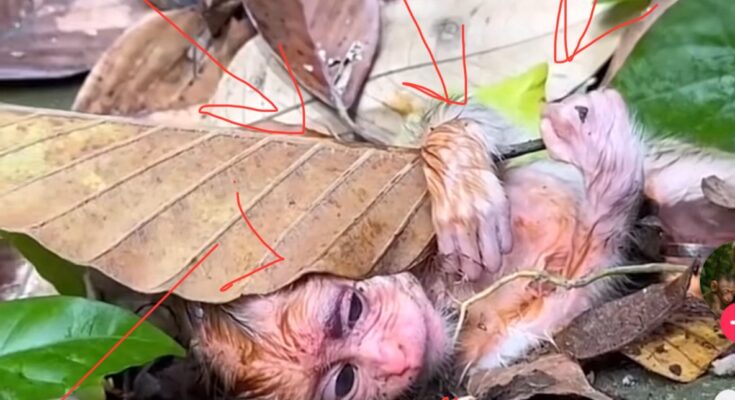In the dense tropical forests of Southeast Asia, a baby monkey now clings to life — and to the memory of a mother stolen by poachers. This heartbreaking story is not just a personal tragedy for the young primate but a reflection of the growing crisis in wildlife trafficking that continues to devastate ecosystems and families in the animal kingdom.
A Tragic Separation
Just weeks old, the infant monkey was discovered alone near a clearing where poachers had recently raided. Her mother, like many adult primates, was likely targeted for the illegal pet trade or bushmeat industry. Unable to fend for herself, the baby was found malnourished and traumatized, clutching a fallen branch — the only thing left to hold onto.
Rescuers from a local wildlife organization described the scene as one of the most gut-wrenching they’ve witnessed. “The baby didn’t understand that her mother was gone. She kept reaching out, crying softly,” said one field worker. “It was a sound I’ll never forget.”
The Cruel Reality of Poaching
Every year, thousands of monkeys are killed or captured by poachers. While some are sold into the exotic pet trade, others are used in laboratory testing or consumed as bushmeat. For every baby monkey seen in captivity, several adults may have been killed in the process — usually the mother, who fights to the death to protect her young.
Poaching not only affects individual animals but also disrupts entire communities. Primates, like humans, form strong social bonds. When one is taken, the emotional and psychological impact ripples through the group.
The Emotional Intelligence of Monkeys
Many people underestimate the emotional depth of primates. Scientific studies have shown that monkeys experience grief, depression, and anxiety. A baby monkey separated from its mother can suffer from lifelong trauma — much like a human child would in similar circumstances.
In the case of this orphaned monkey, the trauma is visibly present. She refuses to eat on her own, clings to any warm object, and cries out during the night. Rehabilitation centers are working around the clock to comfort and care for her, but the road to recovery is long.
A Call for Action
This tragic story is just one among many. Wildlife trafficking remains a multi-billion-dollar global industry, driven by demand and fueled by a lack of enforcement. Stronger laws, better community education, and increased support for conservation efforts are urgently needed.
Organizations around the world are stepping up to protect these voiceless creatures — but they can’t do it alone. Public awareness is key. By supporting ethical tourism, avoiding exotic pets, and donating to reputable wildlife NGOs, individuals can help turn the tide.
Conclusion
The story of the baby monkey who lost her mother is a powerful reminder that the consequences of poaching go far beyond statistics. They are felt in the lives left behind, the cries in the forest, and the eyes of an orphaned baby still searching for her mother.
.



